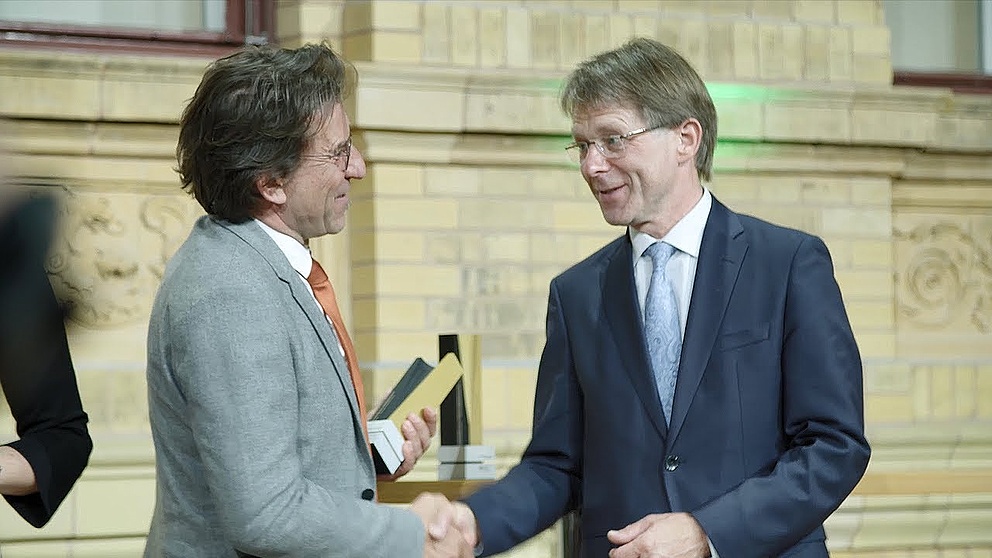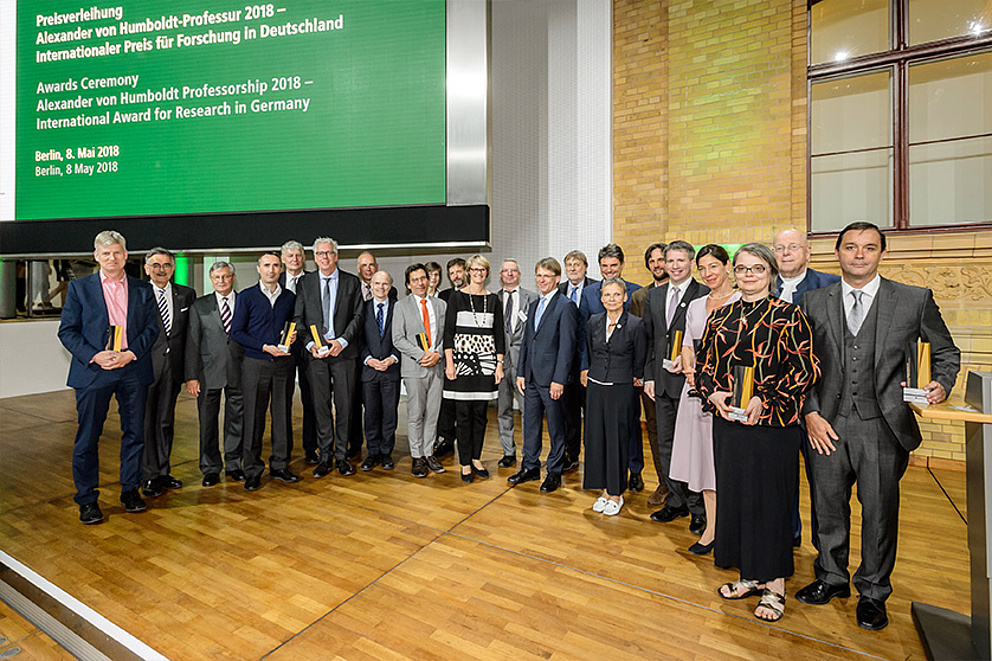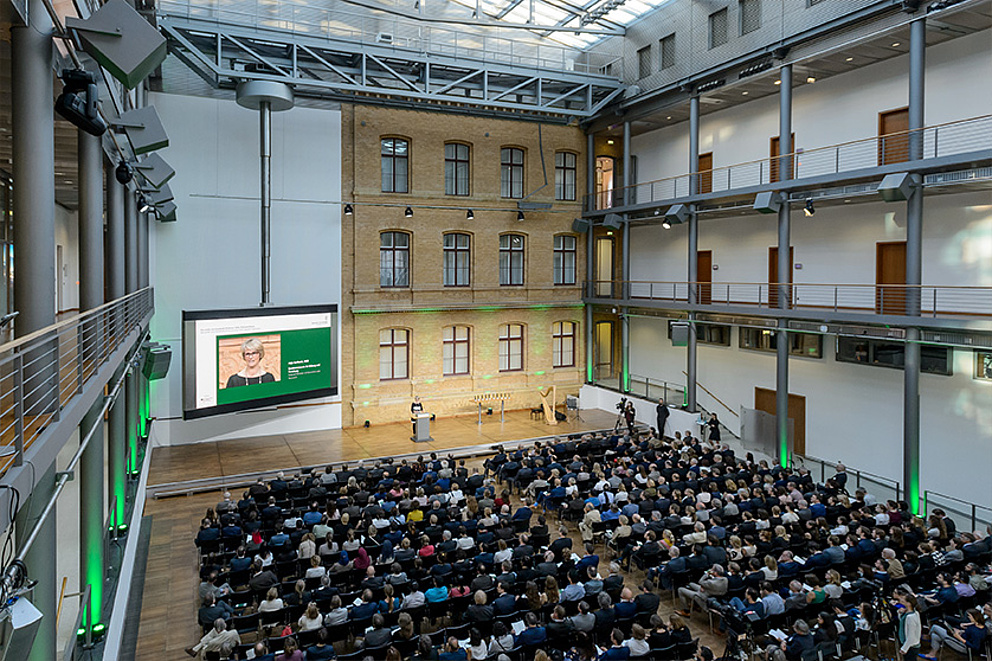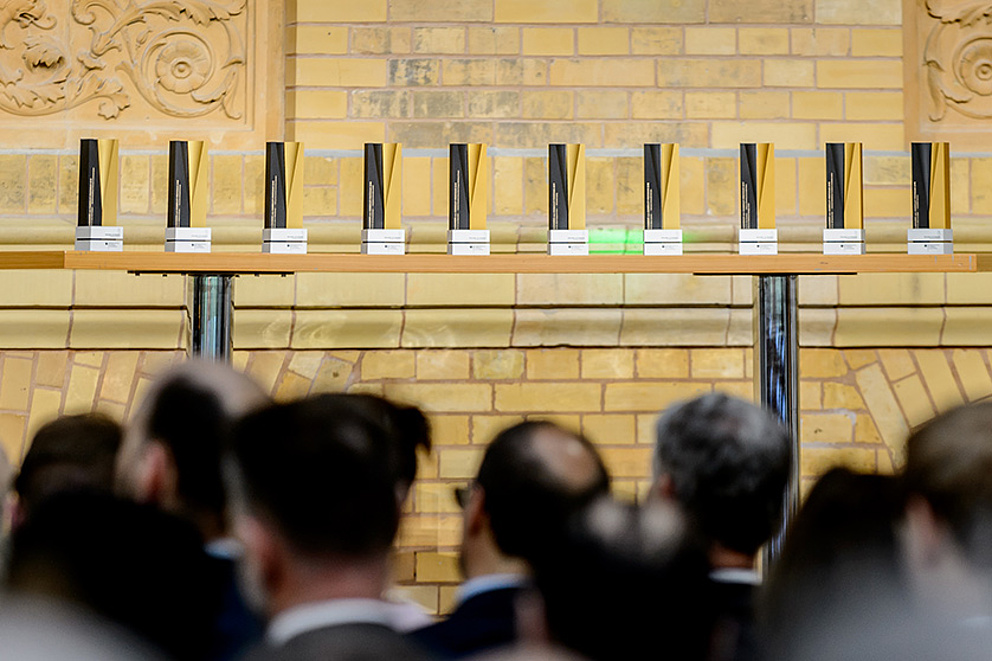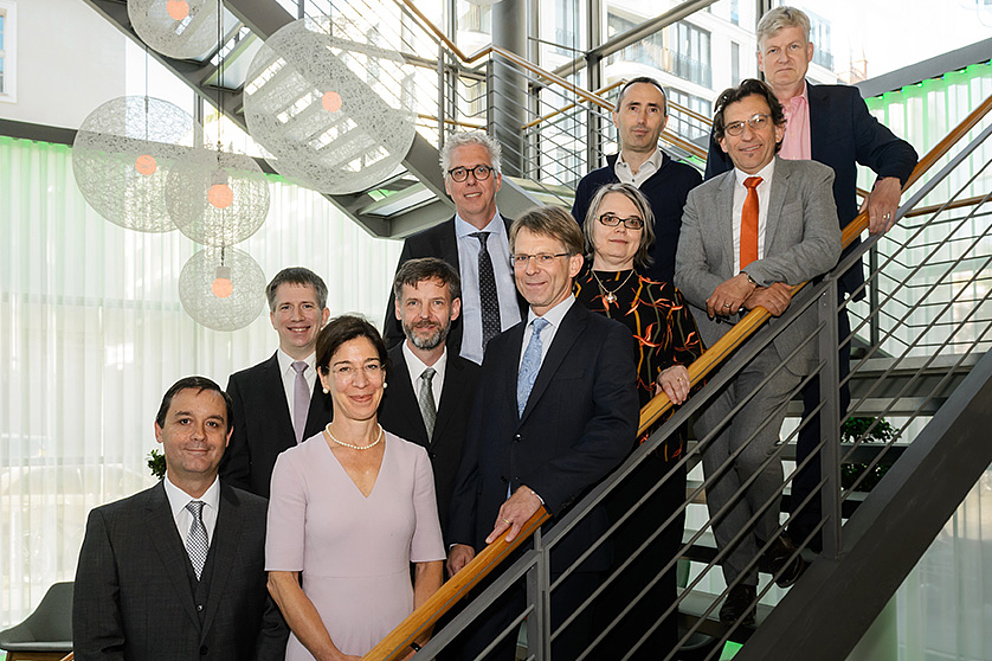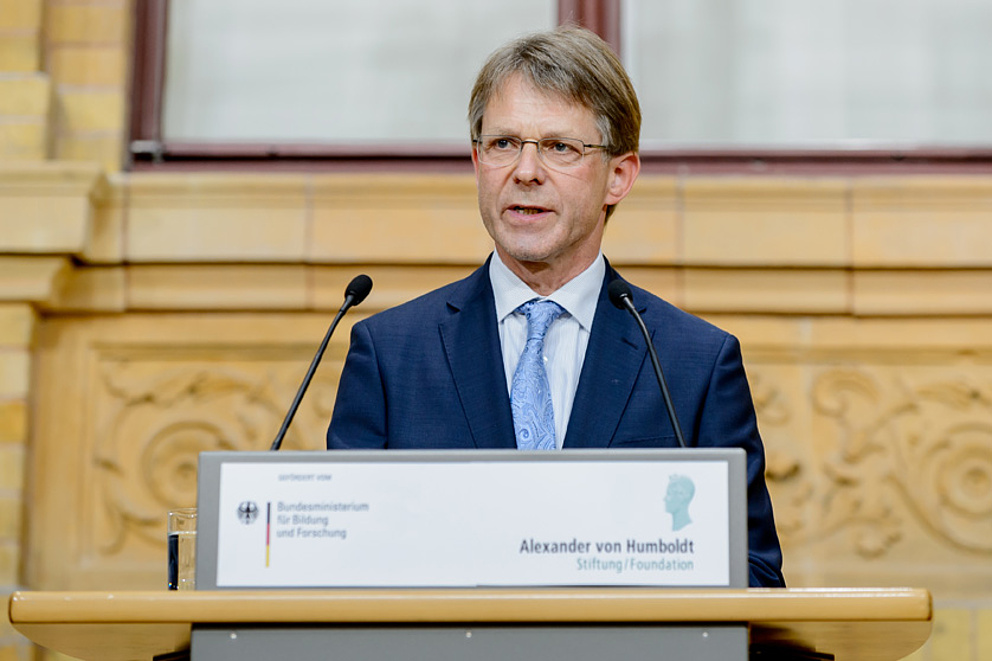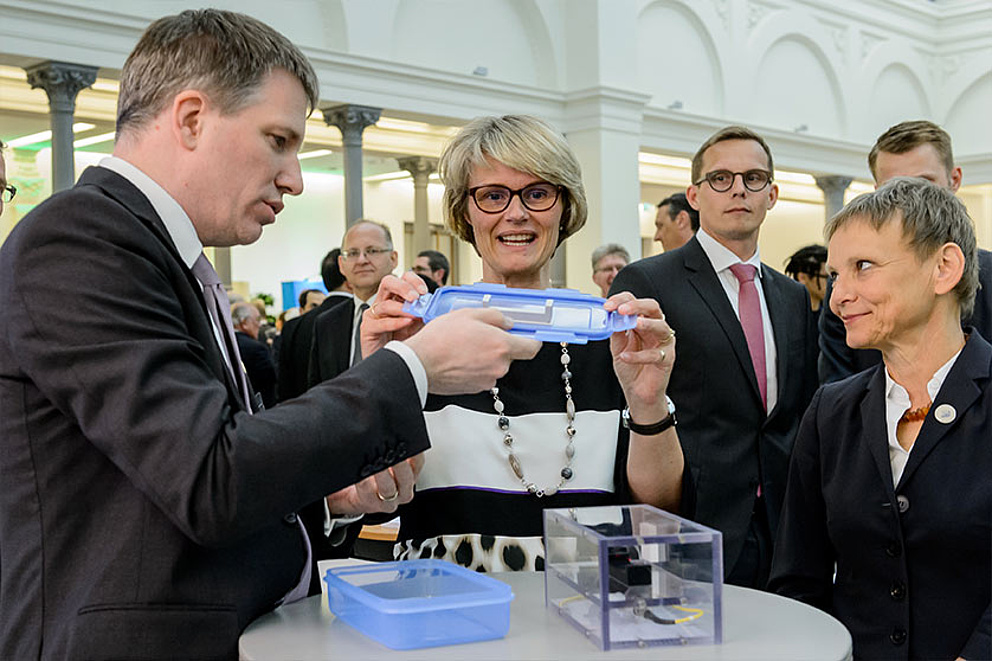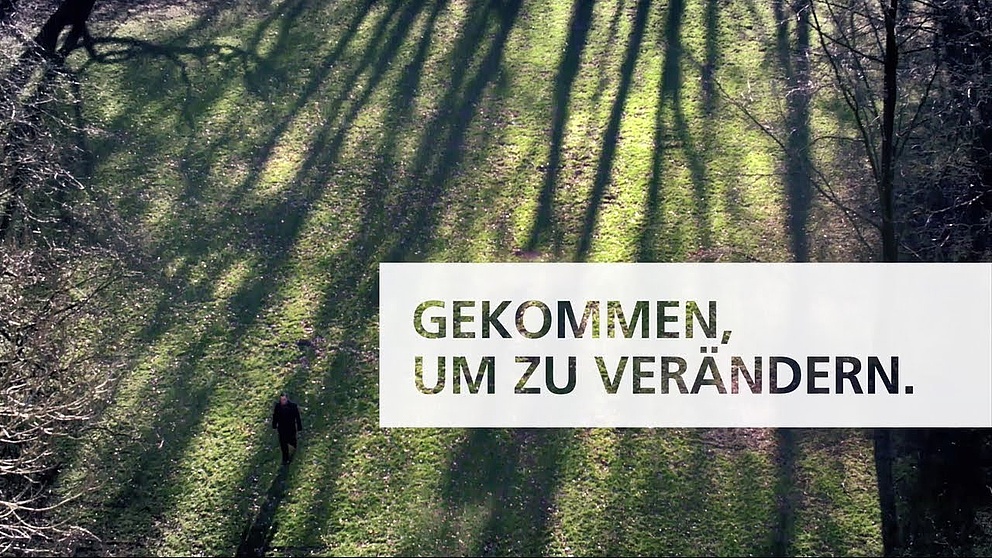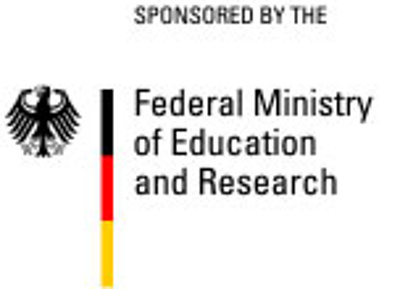
Kontakt
Presse, Kommunikation und Marketing
Tel.: +49 228 833-144
Fax: +49 228 833-441
presse[at]avh.de
Federal Minister of Education and Research Anja Karliczek and the President of the Humboldt Foundation Hans-Christian Pape confer the Alexander von Humboldt Professorships in the anniversary year 2018.
Ten leading international researchers received Germany’s highest valued research award, the Alexander von Humboldt Professorship, im May in Berlin. The German Federal Minister of Education and Research Anja Karliczek and the President of the Humboldt Foundation Hans-Christian Pape presented the awards during a ceremony to Anne van Aaken, Wil van der Aalst, Peter Baumann, Marco Caccamo, James Conant, Ewa Dąbrowska, Arno Rauschenbeutel, Guus F. Rimmelzwaan, Michael H. Sieweke, and Raul Tempone. The event also celebrated the ten-year anniversary of the Humboldt Professorship, which started in 2008.
The award winners were nominated by German universities and research institutions and will now conduct research in Aachen, Berlin, Dresden, Erlangen-Nuremberg, Hamburg, Hanover, Leipzig, Mainz, and Munich. The award is valued at €5 million for researchers conducting experimental research and €3.5 million for researchers undertaking theoretical research.
“Humboldt Professors change our lives with their research: whether they work on new vaccines, manipulate cell ageing, or improve the safety of control systems in power plants. They are given the freedom to fully concentrate on science for five years, to conduct fundamental research and answer questions whose relevance may only become apparent much later,” explained Foundation President Hans-Christian Pape. “The Alexander von Humboldt Professors also come to change our way of doing research and our universities. They contribute very different experiences and backgrounds from their home countries. These influences bring a fresh breeze to our organisations, deliberately stirring up the workings of our universities, breaking traditional subject boundaries and weaving new, interdisciplinary networks. The Humboldt Professors have become a symbol of renewal and interdisciplinary cooperation,” Pape emphasised.
The Federal Minister of Education and Research, Anja Karliczek, explained: “They come from France, Saudi-Arabia, or the USA: With the Humboldt Professorships, Germany as a research location has been able to recruit top scientists from around the world for the last ten years. This benefits our universities, our academic system, and ultimately our entire society.” Karliczek’s message to the new Humboldt Professors: “My hope is that research will actively participate in society. Continue the tradition of your namesake Alexander von Humboldt and explain your research results! Discuss them with the citizens of your community and look for answers together!”
With the Alexander von Humboldt Professorships, the Humboldt Foundation annually honours up to ten world-leading researchers of all academic disciplines working abroad. In addition to candidates’ outstanding academic qualifications, the strategic concepts designed by the universities to offer the researchers and their teams a long-term prospect in Germany are of decisive importance in evaluating the applications. The award is funded by the Federal Ministry of Education and Research.
The award winners at a glance:
- Hamburg: Anne van Aaken (Law/Economics) comes to the University of Hamburg from the University of St. Gallen in Switzerland.
- Aachen: Wil van der Aalst (Informatics/Computer Science) is moving from the Eindhoven University of Technology in the Netherlands to RWTH Aachen University.
- Mainz: Peter Baumann (Cell Biology) has already transferred from the University of Kansas Medical Center, the Stowers Institute for Medical Research, and the Howard Hughes Medical Institute, USA, to the Johannes Gutenberg University and the Institute of Molecular Biology (IMB) in Mainz.
- Munich: Marco Caccamo (Computer Engineering/Real Time Systems) is transferring from the University of Illinois at Urbana-Champaign, USA, to TUM Munich.
- Leipzig: James Conant (Philosophy) has come from the University of Chicago, USA, to Leipzig University.
- Erlangen-Nuremberg: Ewa Dąbrowska (Cognitive Linguistics) is transferring from the University of Birmingham, UK, to the FAU Erlangen-Nürnberg.
- Berlin: Arno Rauschenbeutel (Quantum Optics/Atomic Physics) is transferring from the Vienna Center for Quantum Science and Technology in Vienna, Austria, to the Humboldt Universität zu Berlin.
- Hanover: Guus F. Rimmelzwaan (Virology/Immunology) has come from the Erasmus University Medical Center (Erasmus MC) in Rotterdam, the Netherlands, to the University of Veterinary Medicine Hannover, Foundation (TiHo).
- Dresden: Michael H. Sieweke (Immunology/Stem Cell Research) has transferred from the Centre National de la Recherche Scientifique (CNRS) and the Centre d’Immunologie de Marseille-Luminy, France, to the Technische Universität Dresden.
- Aachen: Raul Fidel Tempone (Applied Mathematics) is moving from King Abdullah University of Science and Technology in Thuwal, Saudi-Arabia, to RWTH Aachen University.
The Alexander von Humboldt Foundation
Every year, the Humboldt Foundation enables more than 2,000 researchers from all over the world to spend time researching in Germany. The Foundation maintains a network of well over 29,000 Humboldtians from all disciplines in more than 140 countries worldwide – including 55 Nobel Prize winners.

